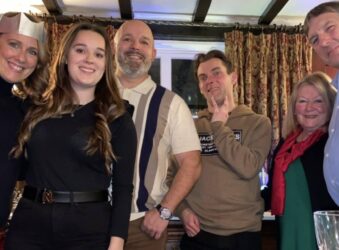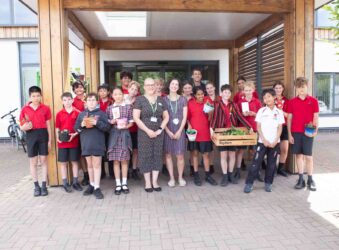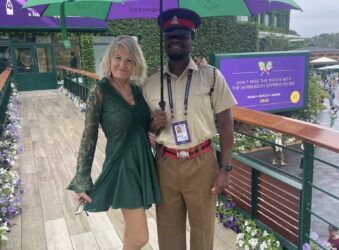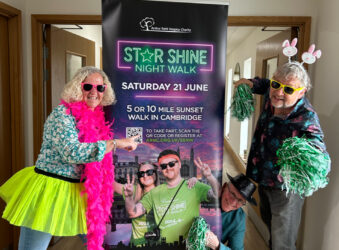Katie Hardy, Ward Sister on the Inpatient Unit
Share this story
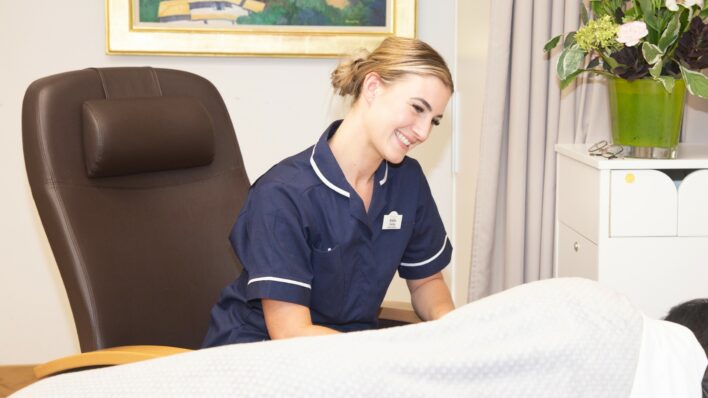
In 2021 Katie Hardy started working as a Band 5 Staff Nurse for Arthur Rank Hospice Charity and then quickly got promoted to Ward Sister on the Inpatient Unit. Before then Katie worked at Addenbrooke’s Hospital, starting her nursing career in Oncology before getting redeployed to Intensive Care during COVID.
Katie shares the reasons why she loves working at the Charity:
What was it that got you into nursing in the first place?
That’s a hard question! I think I’ve just always wanted to do it. As soon as I was 18 years old, and got the grades I needed for University, I never looked back. I‘ve always been that person that wants to help someone and wants to make someone feel better. Yes, that was always the path that I was going to take.
What do you think being a nurse at the Hospice offers that’s different to being in a hospital setting?
I think we have more time here with patients because it’s independent. We always get the time to care for the patients.
Also, because we’re all specialised in palliative care, we have more knowledge than others. When I worked at Addenbrooke’s Hospital I didn’t have the same knowledge of palliative care that I do now, even though I was working on an Oncology Ward. I think, because it is so specialised, you learn what’s best for patients who are coming to the end of their life and you can get on top of that a lot quicker than you would be able to in hospital environment.
What is it about palliative care that you enjoy?
It’s very busy. I mean, everyone’s very acutely unwell but also palliative care is making someone’s last moments as good as you can make them. We get a lot of patients who come in and they’re very symptomatic and then we end up getting them really comfortable and that’s really nice to see.
As much as it is about the patients, their whole family’s going through a hard time as well and we get time to work with the families too. Supporting all of them is really rewarding when they might be feeling rubbish and so low. It’s just being that person that can brighten someone’s day.
There is quite a good variety of work then. Do you get to see a lot of different things and treat a lot of different patients?
Yes, patients with all sorts of diagnoses and you get to learn all the different ones and how we can manage them as best we can. We get a range of everything. Not everyone here comes here to die. People come here for symptom control. So, we’ll get on top of their pain or their nausea and then they’ll go home again. We get patients that are in bed, and coming towards the end of their life, but then we’ll get patients that come in that are still mobilising and it’s nice to have a range.
Is that what you prefer about it, building that relationship with the patients?
Yes, everywhere’s short-staffed, particularly in the NHS and hospitals. We do get short staffed sometimes here too, but you still seem to be able to care for someone better. Here, care is solely palliative, so that is something that I enjoy and specialise in – in hospital’s there are lots of different specialities.
Did you choose to work at Arthur Rank Hospice or could you have gone to different hospices?
No, I chose to work here because it’s independent. We are sort of connected to the NHS in the fact that we take patients from Addenbrooke’s Hospital, so I applied for the job here. I originally started off in as a Bank Nurse actually just to see if I’d like it – and day one I was like, “I’m staying here’! It’s a lovely place to work”.
What’s kept you in it? Why do you do what you do?
I love my job. I go home every day feeling like I’ve made someone’s day better, I’ve made someone feel better. It’s so rewarding just being there as a support for patients and families going through a really hard time. There have been times, especially during COVID, when it’s been really difficult and you sort of question how you feel about your job but there was never a second I was going to leave, it was just obviously very difficult times.
When it does get challenging, is there support from the Charity for yourself as well?
Yes, and I think that’s what I didn’t get in the hospital. They are very supportive in hospitals but here it’s a smaller team here, so it’s more like a family team, and everyone gets to know you really well. They know when you’re having maybe an off-day and you do get support here. We get supervision and 1:1’s and reflections, which you need in this type of setting.
Are there plenty of opportunities for yourself for career progression and things like that?
Yes, definitely. I was here for a year before I progressed to Ward Sister which I think for my age is sometimes not so heard of but, I took it on the chin, and I wanted to do it. They do loads of training here and there’s a lot of education involved so you can progress as much as you like.
We have Band 2 Healthcare Assistants and we’re now rolling out Nursing Associates which is a Band 4, so some of our Healthcare Assistants are getting the opportunity to do that role, which is a big progression. It’s really good.
What sort of training is on offer?
There’s loads of things. So, you can learn communication skills, psychological support, end of life across faiths, a lot about religion and how we can help with different religions and there’s loads of courses. You can book those either internally if you work here but you can pay for it and come externally as well, so that’s really good.
Why do you think someone should come and work as a nurse in a Hospice or a different setting that’s not a hospital?
It’s just amazing. I was a bit worried that if I came here, it wouldn’t be as busy. I thought it would be a lot more chilled and time to sit down but I didn’t want that, I wanted to keep busy – actually it is really busy. It’s very acute. We get a lot of patients deteriorating quite quickly so there’s just a lot of things that are happening and a lot of symptomatic patients.
I think in most different settings like hospices, you do have a smaller team. So, the team dynamic’s just better. You work better in a team because you know everyone. We do have time for patients here. Staffing levels are usually fairly good although we occasionally we do get short staffed, and we manage it as best we can.
The patients can have complimentary therapy, psychological support, a lot of things that maybe you wouldn’t get in a hospital as such. The park and ride carpark is so close and we’ve got a Bistro and a Hair Salon here too for patients and the general public. So, there’s a lot more to offer in a Hospice, I think.
I think if you love palliative care, then somewhere like this is perfect because if you want to give that time to someone, you’re probably not going to get as much time in a hospital setting, whereas in a hospice you’ve got the time to spend with the patient and the family.
In hospitals you can be going anywhere and everywhere, at least here you probably get to have more of a stable team. Is that right?
Yes, everyone knows each other so well because it’s such a small team, you’re not going to get moved anywhere. In hospitals, I used to do bank shifts on wards, but then I’d get moved to another ward – which was absolutely fine. They had to put us wherever we’re needed, but that can be difficult because no one knows you, and you have to get to know everyone and learn all the different specialities as well, which is helpful, but when you know that your speciality is palliative care, then you might as well stay in that speciality.
For people that might be thinking of relocating, what is it about Cambridge and the surrounding area, that makes it a good place to live?
Cambridge is amazing. It’s a great place, it’s beautiful and there’s lots of nice places in the surrounding area. Addenbrooke’s is an amazing hospital. I know it’s one of the best I think particularly for Oncology and other specialities like that. It’s a really good hospital and obviously this place, Arthur Rank Hospice Charity, is an amazing Hospice and it’s an amazing place to work.
View other stories
-

Hospice supporter climbs Snowdon in memory of her Uncle Piers
Molly is inspired to fundraise in memory of her Uncle Piers
-

St Faith’s pupils support Hospice in memory of their teacher
Mrs Allanson remembered by her pupils
-

Cambridge Hospice Volunteer supports with pre-loved fashion at Wimbledon Tennis Tournaments in London
Volunteer, Nadia Macari-Brown supports the Charity at one of the most famous sporting events in the world
-

Friends walk for Sherrall at Star Shine Night Walk 2025
A group of 18 friends from Royston walk in memory of Motor Neurone Disease Patient, Sherrall

